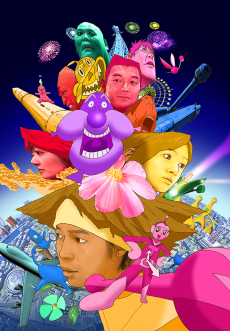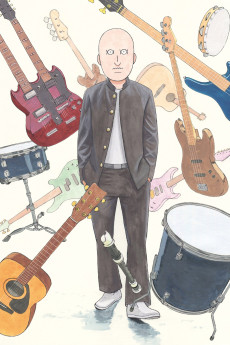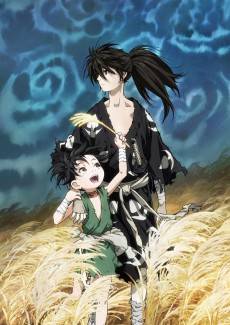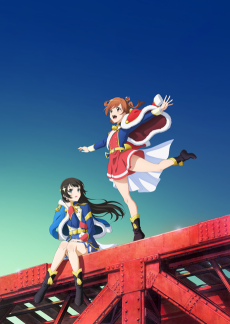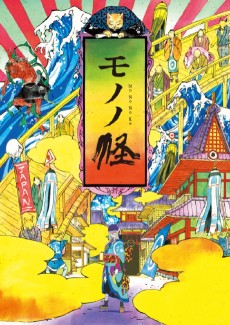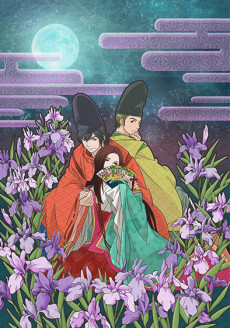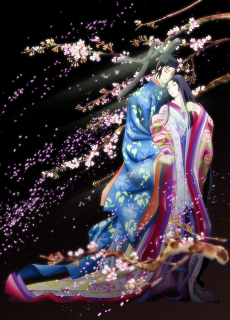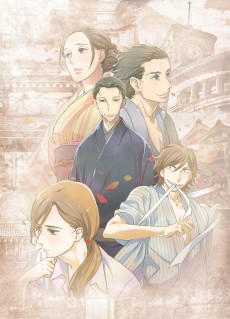INU-OU
MOVIE
Dubbed
SOURCE
OTHER
RELEASE
May 28, 2022
LENGTH
97 min
DESCRIPTION
Musical fantasy film based on Hideo Furukawa's Heike Monogatari: Inu-Ou no Maki (Tales of the Heike: Inu-Ou) novel.
Inu-Oh is born with unique physical characteristics. His parents cover every inch of his body with garments, including a mask on his face. One day, Inu-Oh meets a blind boy named Tomona, a biwa player. As Tomona starts to sing and play, Inu-Oh is amazed to discover he has an incredible ability to dance. The two become inseparable. Tomona and Inu-Oh start sharing their talent with audiences. Their performances quickly gain acclaim and draw crowds. But why is Tomona blind? Why was Inu-Oh born looking like he does? A story about a legendary artist from 14th-century Japan, who defied fate to forge his own destiny. An anime in the form of a rock operetta with spectacular music and dance sequences.
(Source: Warsaw Film Festival)
Note: The film received an early premiere at the 78th Venice International Film Festival on September 9, 2021.
CAST
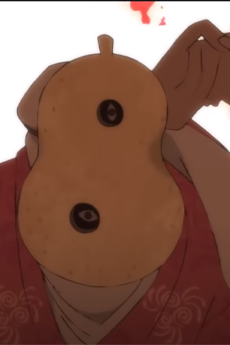
Inu-Oh
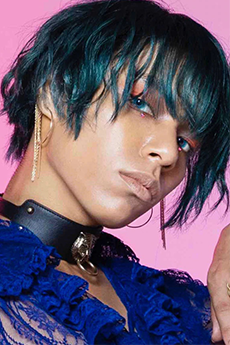
Avu-chan
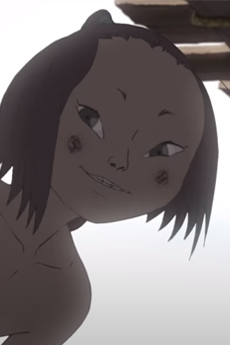
Tomona
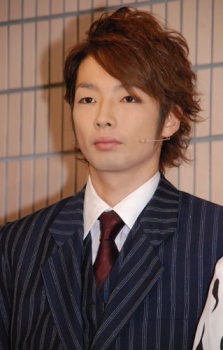
Mirai Moriyama
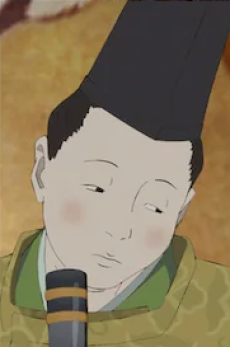
Yoshimitsu Ashikaga
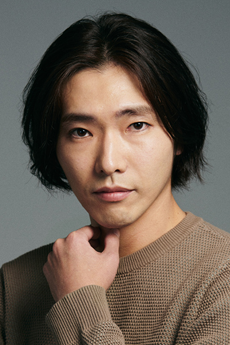
Tasuku Emoto
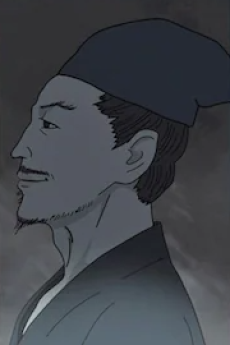
Inu-ou no Chichi
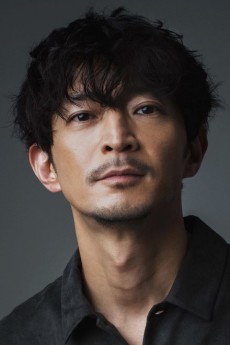
Kenjirou Tsuda
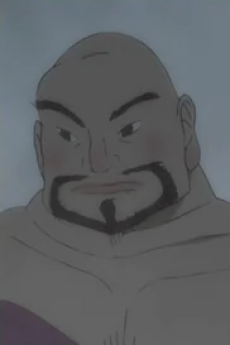
Tomona no Chichi
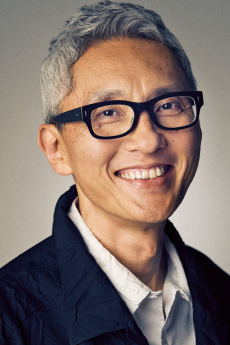
Yutaka Matsuhige
REVIEWS

Wavieff
90/100THE GRAND JOURNEY OF OUR SOUND.Continue on AniList
There are going to be reviews out there that compare Inu-Oh to Heike Monogatari, and this is on basis of source material alone. Both are based on the Heike periods of Japan, both have watercolor styling, and both are done by production studio Science SARU. These reviews are wrong. Inu-Oh has more in common with a street-side concert or a friend’s house party gig. It has more in common with a small venue and a loud local band that’s a few notches too loud; It has more in common with the street musician you pass by and almost think about giving a couple bucks. It's a psycho-sexual self-actualization amidst a culturally stagnant society, where putting your axe to the grindstone everyday for a shave you don't like is the only thing you do because you've been told to stay alive your whole life. “Staying alive”, what does that mean? It means to reveling in the endless passion of your feats, honing every ounce of spirit you can feel leaving your body, grabbing them and forcing them back into a purified essence that is true life. Not establishment, but self-actualization. Inu-Oh's rejection of normalcy comes in multiple ways. The rejection of gender, the rejection of stagnation, and the rejection of mundanity all at once. The rejection of a one-size-fits-all cookie cutter marries the acceptance of the ever-changing mold of our being.
“Here we are. You and me.”

No matter how big-armed or demon-faced or otherwise indescribably ugly you are, you must realize you are the only iteration of you that truly exists. Flaunt your big-ass gross-ass nasty-ass arm because people adore that. Is it normal? Far from it, and far be it for you to hide it any longer! What happens when society takes that same arm away from you? You grow it back.
“I hear it’s out of this world.”

Organized society is old news. As long as we love others and love ourselves, that is true wealth. So says the overwhelming spirit of Inu-Oh. Inu-Oh is a ballad to the soul, a strike to the veins, and a performance of life. Why embrace tradition when you can embrace yourself instead? Everyone wants to be somebody, then embody that somebody. BE grisly, BE disheveled, BE unsightly, but above all, BE unreasonably you. Dare to be darkness in the light.
“Hey, you! Are you seeing this? Yeah, I’m seeing it, too!”

This is our moment. Let it never be anything else than this. Let it never be the future or the past, let it be now. Inu-Oh laughs in the face of rules, mocking repeats them aloud, chews them up, and spits them out. It's not so much a portrayal of man’s evolution as much as men have always been this. Not just men, but conscious entities, the first of the globe, built with purpose and drive. We are the first creatures we know to completely wallow into ourselves. This world is an endless source of beauty that resounds against every establishment, every rule we’ve ever known, and it's irrevocably tragic how many of us will never realize our full potential. Those are the bounds of society, meant for guidelines but taken as rules, taken as the status quo. You are never taught to be yourself or to try something outside the box, you must discover that all by yourself. That is Inu-Oh. A creature born of something, some demonic force not meant to exist, but that exists anyways, and must cope with its reason for life. For Inu-Oh, it is a life of performance. For you, that may be something different. However, there’s always that looming ceiling above our heads. Conformity may want you to be something else; it may want you to revel in the disgusting, morphing, unsightly parts of yourself and critique them, instead of acknowledging the unique beauty of you, as no one else can be who you are. The combination, the sum of what makes you you is something that will never be replaced to such a specific degree so why care about fitting any mold? Wear makeup. Dance in the street. Scream your heart out.
“Sing, dance, and go wild.” / “Everything is fiction.”

They will clip your branches, you will bleed, it will hurt to push forward. But keep playing. Playing is the ultimate rebellion. Everything is fiction, so act accordingly. If this film is a closing ceremony for Yuasa, there is not a better note to end on. It is what he's always done - broke the norm, stretched the envelope, rejected tradition. At the same time, while it may be a goodbye to himself, it's a hello to the new in the same breath. It’s a passing of the baton to new talent, to a promise of the future whilst acknowledging the past in a single brush stoke. Art is never over. Inu-Oh portrays the Heike as humanity, and Inu-Oh themself as its vassal, in form of an extravagant creative. Those who embrace themselves embrace the world. Let it never be otherwise. Let us perform our song.
“Here we are.”

if you only perform it once, let it be yours.
it's not all glory, there has to be pain. there must be. always.
but that's okay.
because you did indeed perform. because you did that yourself.
and because you did it once, you'll do it for eternity.
climb on the back of history and write yourself into it.

GreenRevue
80/100Inu-Oh is a gorgeous, imperfect, scream of passion.Continue on AniListWhile Yuasa is a director who I have been somewhat mixed on, not in terms of his visuals (they are basically always gorgeous with Japan Sinks 2020 the exception), but moreso the overall emotional connection I have to his works and their narratives in general. Tatami Galaxy and Ping Pong I adore, for their respective stories on appreciating the life you have and on coming to terms with your place in life and sports and where you want to go with them. Plus, I really like Night is Short too but have more problems with it. However, I don't quite love Kaiba or Eizouken, as the former is too messy in my eyes for the emotions to fully land, and the latter just didn't do much for me in general but may need a rewatch. On top of these middle grounds, I hate Japan Sinks 2020 which I doubt I need to explain and Devilman Crybaby which I found morally hypocritical and unnecessarily shock-based. His work is capable of incredible highs, and rarely fails visually, yet narratively I don't always connect. As a result, I was aprehensive going into Inu-Oh because I was concerned the narrative and emotions would crumble for me.
Ultimately, while the narrative was messy, I adored Inu-Oh, as the emotions still came through.
Inu-Oh is an imperfect scream of passion.
The film's pacing felt a bit off and occasionally lost my attention, the ending a bit abrupt, and the repeated animation and music a bit annoying and distracting. Yet, it is great in so many ways. Anyone who says Yuasa has been toned down in recent years and more commercialised is in my opinion not entirely wrong, though they downplay the worth of those stories and the formal genius still on display, plus the fact he still innovates and teaches. However, this is not withholding anything in my eyes, an absolute explosion of art. Formally pushing itself, with incredible shifts in art style, each as well considered and expressively raw as the last. It is very impressive how much Yuasa pushes the visuals in here, and how strong the sound design and passionate the vocals such as those by Avu-chan are etc. Not a return to form per se, but an exclamation that the form never left. Yet more than that too.
Is it about art and making art? About finding your own path separate from your parents and the past? About the need for telling stories and the difficulties that come with that (and thus a nice bounce off of Yamada's companion piece of sorts)? Is it about finding your voice? About how many people and voices were drowned out in the past, and shouldn't be now; how the people alive today should let voices be heard? About marginalised communities? About the stories that are and aren't (or aren't allowed to be) told? About stories of the old and lost needing to be kept and new needing to be forged? About greed? As an expressive art piece about making art is it semi-autobiographical to Yuasa's recent works and changes in style? Is it about gender identity and identity in general? Is it about all these things and maybe more?
Probably. Damn.
Here we are

Plazeer
100/100You are free to be who you want to be and do what you want to do.Continue on AniListThis is an edited version of my past review, I wasn't feeling happy about it so I added things that felt important to me.
Also this isn't spoiler free especially toward the end of the review so beware.
Fuck society, standards, establishment, traditions and everything that binds you, just be who you are, do what you want and love people.
That's what Inu-ou told me through these 1h37, supposedly a story about the heike it's actually closer to something like Shiori experience, even Macross 7 and it's going to break your expectations to pieces and build something even crazier with these pieces just like Yuasa knows how to do.We follow the story of tomona and Inu-Ou who stray off the path their life shoulda been established on. Tomona was meant to be a biwa priest and player the day he became blind and went on a journey. He changes his name throughout the movie, going from Tomona, his original name, to Tomoichi, the name he was given when he joined the biwa priests troupe and finally Tomoari, the name he chose . The troupe of biwa priests he was in is a group of blind and bald men who are under the authority of the shogunate, they are the symbol of traditionalism and authority . When Tomoichi becomes Tomoari he breaks these shackles, empancipates from the mold of traditionalism, revoke the authority, ignore the few priests who hates and criticize him because of the way he is and that's how he definitely becomes himself. He becomes a rockstar and rock is the perfect choice of music to fit his character, it breaks with the traditions and what has been established before, he wears make up, lipsticks, perfumes, extravagant clothes, very high okobos (the type of geta he wears I think), he even holds his biwa like a guitar. His performances are live spectacular shows outside with fire eaters, he becomes a real rockstar on stage taking off his clothes and throwing them, playing his biwa behind his head like Jimi Hendrix, jumping around, climbing on the bridge fence. I love the contrast between Tomona and the setting of the story he literally is a rockstar in feodal japan and that's what makes him so unique. He is fucking free and he does what he wants.
Inu-Ou was not even supposed to exist, he isn't named, was living with the dogs, his hideous body hidden yet even destined to not exist, he forged ahead and did what he wants understanding that his uniqueness was what made him who he is. He actually was the most free person, he didn't have a name restraining him so he chose his own name and his destiny alongside it. Aware of his uniqueness and along Tomona he kept dancing, performing and singing under the name Inu-Ou in a unique way on the polar opposite of what "Noh" is, a very slow and elegant performance. He pulled up with crazy and impressive shows and used what makes him different to get the show to even higher skies, and people loved it because he is himself, he's the only one having a giant ass long arm and a scaly back He coulda hated everyone and everything considering is life but he didn't give a fuck, he loved and forgave everyone, even his father and did whatever he wanted without caring about what he was. That's why he could shine that brightly.
Their performances are about lost Heike stories who are told by spirits to Inu-ou, which is something not to the pleasure of the current shogunate because Heike are products of a tumultuous past and the authority wants the control over it to bring order and unity. They don't give a fuck though, whether its the Heike spirits, Inu-ou or Tomona they play to their hearts content, have the best fun and best laughs, embrace everything they do to the utmost without caring about anything, they are here to keep the story of the Heike alive, even if they are banned and hated you can't forget about them because they were their own person too, and even if the shogunate will cut their branches, hurt them, threaten them, censor them, they keep playing because that's what they are about, never submitting, being who they are, they go crazy, sing like no one ever did before, perform biwa like no one has ever seen before, may it be called a bastardized or disgusting art, they don't care, they reject every tradition that tries to restrict them and they live fucking free.
When Inu-Ou finishes a performance, if the spirits who keeps him cursed are rejoiced they leave happily and his curse gets lift off bit by bit. To me that's how Inu-Ou loses is uniqueness, he is slowly but surely conceding and fitting in the mold to the point where he accepts to lift his mask in the last performance, truly a grand finale but in my opinion that's when he finally gave up. After their immense finale performance, the shogunate bans and censor every new tale about the Heike and Inu-Ou that they didn't allow to be told. They banish, execute and strip the Tomoari's troupe of everything, they are erased, them and everything they did. Inu-Ou joins the shogunate but he isn't allowed to perform any of his Heike tales anymore. Though he was known as the most talented performer of his time, he was forgotten and Zeami had his name written down in history instead of him.
However "Everything is fiction" and "That face is just another mask" that's what Inu-Ou says when he's dining with politicians and he will stay true to this up to the end. In one of the last scene while the shogun is telling him that he won't be performing anymore, that the Tomoari troupe is disbanded and that he won't be able to see Tomoari ever again, while he is bowing it's clear that he his in madness. So he chooses to perform his actual final show, he puts on a new mask and will perform up until he can meet Tomoari again.
On the other side, Tomoari became Tomona again, he wasn't a biwa priest or a rockstar anymore and he gave up on the name he chose. He picked the name Tomona again, conceded to the hate and became what his father wanted him to be. He then kept singing his hate toward the shogunate instead of singing the life of Inu-Ou.
But they'll meet again, two spirits whose story has since been forgotten. They'll perform again together with the name he gave himself and him without any mask, free to be who they are and free to do what they want.
Fuck traditions and establishment, You are free to be who you want to be and do what you want to do.
What makes this movie even better aside from what I said before, the visuals, animation etc is how it echoes with Yuasa's career as a director. As his most likely last directed show I feel like he conveyed all his feelings he had on his career in this movie, this man never gave a fuck about pre established standards he did things his own way, was criticized for it, hated, misunderstood, people tried to make him like everyone wants him to be, they tried to make him do what everyone wants to see but he didn't, he kept doing his things his way despite everything and now he is recognized.
The direction is as great as Yuasa usually does, lots of frames are talking by themselves but my favourites are probably the scenes from the pov of Tomona's blind eyes, the way things slowly appears on the screen when he hears em because he originally know hows they look like since he isn't born blind or how he's not turning toward the fire on the scene where he's on the bridge with Inu-Ou. All the Inu-Ou performances were also crazy especially the last one that lasts for like 15min and is just splendid.
I think I definitely missed a lof things in this movie but I'm happy I was able to write down the feelings I got watching it for the first time since It's not something I usually do, I'll definitely watch it a 2nd time one of these days.
I fucking love you Yuasa Masaaki, I have yet to watch everything you made and I wish it to stay this way so I know I'll always have something to watch that will be made by you if I need to, at least Natsume Shingo works gives me the same feeling as yours so I should be fine for now.
SIMILAR ANIMES YOU MAY LIKE
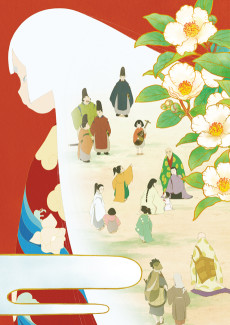 ONA DramaHeike Monogatari
ONA DramaHeike Monogatari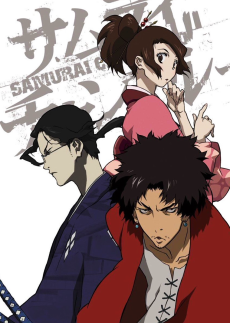 ANIME ActionSamurai Champloo
ANIME ActionSamurai Champloo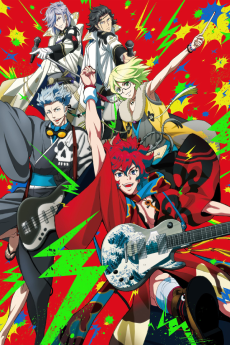 ANIME ActionBakumatsu Rock
ANIME ActionBakumatsu Rock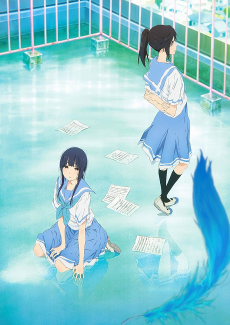 MOVIE DramaLiz to Aoi Tori
MOVIE DramaLiz to Aoi Tori
SCORE
- (3.95/5)
TRAILER
MORE INFO
Ended inMay 28, 2022
Main Studio Science SARU
Trending Level 1
Favorited by 414 Users
Hashtag #犬王


